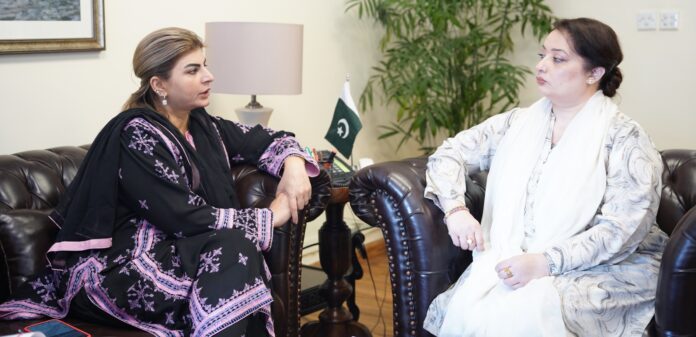By Asim Hussain
ISLAMABAD: Chairperson of Senate Standing Committee on Human Rights, Senator Samina Mumtaz Zehri, and Coordinator to Prime Minister on Climate Change, Romina Khurshid Alam, have reached a consensus to advocate for the integration of human rights into climate change policies in Pakistan.
During a bilateral meeting with PM’s aide Romina Khurshid here on Sunday, both sides also agreed to jointly work to roll out a viable action plan to ensure that climate actions not only address environmental issues but also uphold and protect the rights of vulnerable communities affected by climate change in the country, especially in the highly climate vulnerable Balochistan province.
“Integrating human rights into climate change policy is essential to ensure that actions to tackle climate risks do not exacerbate existing inequalities or infringe upon basic human rights,” Senator Samina Mumtaz Zehri highlighted during the meeting with the PM’s climate aide.
She said, “Climate change significantly undermines’ fundamental human rights, including the right to life, health, food, and water, reflecting an increasing awareness of these pressing issues.”
The Senator Zehri remarked, “I personally believe as various studies show that managing human rights into climate risk management action plans and discourse is crucial for creating and promoting a more just and equitable approach to tackle the climate crisis, particularly for resource-poor and marginalized communities in the vulnerable areas in Balochistan.”
She pointed out, “Being a large and arid region in the southwestern part of the country, the Balochistan province is extremely vulnerable to climate change due to a combination of its geographic features, socio-economic challenges, and existing environmental stresses.”
“The region’s vulnerability is aggravated more due to its dependence on agriculture, water scarcity, and limited and shabby infrastructure, making it highly sensitive to adverse climate risks, particularly devastating hill torrents, flash floods, cyclones, sea-level rise, heatwaves, declining rainfalls, and droughts,” Senator Samina Mumtaz Zehri added.
She called for strategies that prioritize equity and justice in confronting this critical challenge of climate change for both mitigating adverse fallouts of climate change and promoting a fairer society with access to equitable access to resources required for climate resilience building.
Senator Zehri urged for well-coordinated and cooperative national efforts that uphold and protect these rights, noting that human activities not only contribute to climate change but also threaten basic human rights.
“Marginalized groups, such as women, children, and economically disadvantaged communities, are particularly vulnerable, often lacking the means to adapt to climate impacts and facing greater obstacles in accessing their rights,” she added.
“Climate justice highlights how those least responsible for climate change frequently endure its most severe consequences.”
She called for fair distribution of resources and support for at-risk communities to address these inequities.
Meanwhile, PM’s climate aide Romina Khurshid Alam remarked, “The ongoing climate crisis continues to affect a wide range of human rights, including the right to life, health, food, safe water and sanitation, shelter, and a healthy environment.”
“Integrating human rights into national climate change policies by recognizing climate change as a human rights issue will be a first key step towards ensuring advocating for the policies take into account the social and economic impacts on individuals and communities, particularly those who are most vulnerable parts of the country, particularly in Balochistan and Gilgit-Baltistan,” she highlighted.
The PM’s climate aide Romina Khurshid Alam assured the Senator Samina Mumtaz Zehri of her all-out support to achieve the goal of climate justice by ensuring that human rights-based climate policy and action plans were framed in consultation with vulnerable communities and implemented at grassroots levels for attainment of the people’s human rights to healthy life and environment, particularly during disaster times.





